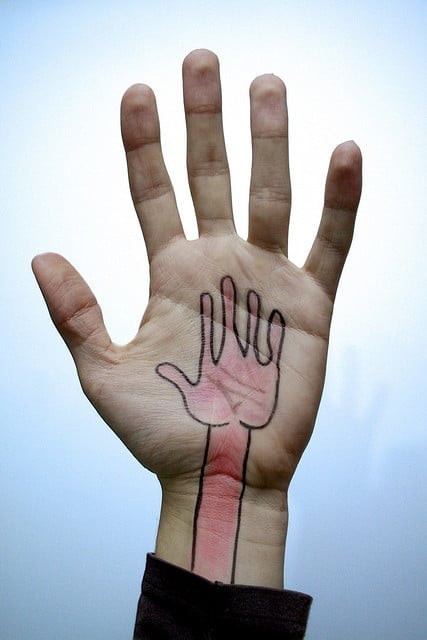Adam Lanza’s mother apparently once warned a sitter not to leave him alone. James Holmes had previously sought help for mental health issues. Seung-Hui Cho had likewise been diagnosed with mental disorders, but discontinued treatment before coming to Virginia Tech. During pre-trial hearings, Jared Loughner was diagnosed with schizophrenia. All of them seemed to be wrestling with mental illness. Or perhaps they weren’t wrestling anymore, the illness – at least momentarily – had won. What happened that these men seemed to fall through the cracks? How did no one notice potentially dangerous behavior in some, or not take appropriate action in others?
It isn’t surprising that gun control is back on the national agenda. We’ve been witness to 31 mass killings in the United States since Columbine in 1999. We may finally be seeing a paradigm shift when it comes to new gun regulation. But something deeper is happening with these events, contributing to the violence in an important way. A closer look at the string of massacres just since 1999 should tell us that we need more than gun regulation alone.
***
When I was a novice Jesuit, I spent several mornings a week working at Portland, Oregon’s Downtown Chapel. Our work was simple: to offer hospitality to anyone who came through the doors. We offered a warm, dry place to sit and rest, a hot cup of coffee, a little bit to eat, a few toiletries.
The men and women who came into the Downtown Chapel ended up on the streets for all kinds of reasons, but for many, mental health issues were, as social workers and psychologists might put it, “major contributing factors.”1 Mental illness can make it hard for people to hold down steady employment. Mental illness can make it difficult to stay in stable housing.2 Mental illness can break family relationships.
Some had disorders like schizophrenia or bipolar disorder. They held frenzied conversations with invisible counterparts, or sat in silence, disengaged from their surroundings. Sometimes they had fought these same demons since childhood, or they appeared later in life, often suddenly, like the grating buzz of an alarm clock in the morning, only instead of waking up they were entering a nightmare. There were a few military vets with PTSD. Some of them fought in the most recent wars in Iraq and Afghanistan, some had been struggling since Vietnam. They seemed constantly angry and agitated, trying to regain the grip on life lost in crossfire on a far away battlefield.
I remember one man in particular. “Johnny” was about my age. He had fought in Iraq, and was discharged honorably. But coming home, he lost control of his life. Something changed in him overseas. He was angry and prone to uncontrollable outbursts. They were verbal and sometimes physical. He was paranoid about the people around him. He lost his job when he couldn’t show up on regularly, and without a job he lost his home. His family became afraid of him and cut off contact; did they even recognize the nature of his illness? Did he recognize it himself? Jobless and homeless, drugs like marijuana at least gave him a sense of calm. Experts in the field euphemistically call that “self-medication,” and when it leads to addiction the problem is only made worse.
Many of the men and women I met at Downtown Chapel were left in a bleak situation, often away from family, with few friends and little support, imprisoned in loneliness and isolation not only physically but psychologically, homeless and lacking basic medical care much less mental health care. Now, there are those who question the focus on mental health as a cause of gun violence. They say it’s unfair to do so when mental health is responsible for such a small percentage of gun violence.3 But I can’t help wondering: even if there was no connection between mental health and gun massacres in this country, is the neglect of these mentally ill people not utterly inhumane? How do we abandon our sons and daughters and brothers and sisters to such darkness?
And how did we end up here, with people on the street instead of in appropriate care, “self-medicating” instead receive proper medicine? “Ronald Reagan shut down all the mental hospitals, and drove all those people onto the streets.” That’s a trope I’ve often heard to explain the prevalence of mentally ill people among the homeless population. I heard it from my dad when I was a kid. I heard it when I was in college, in some class on “the causes of homelessness.” I’ve heard it among the volunteers I’ve met along the way, including at Downtown Chapel. At this point, it’s well-ingrained in my own psyche.
***
It’s not that simple, of course, and the reality, as always, is more complicated that I’m often willing to allow. What is true is that the care and treatment provided to the mentally ill is entwined with the political history of the last 35 years. That take us all the way back to the presidency of the peanut farmer from Georgia: Jimmy Carter.
President Carter established a Presidential Commission on Mental Health in 1977 – the first time a study of mental health care in the U.S. had been taken at such an authoritative level. By this time, the causes and effects of mental illness in veterans from the major wars of the 20th century had drawn attention to the issue, and mental health care had shifted away from institutionalized care towards community-based care.4
As a result of Carter’s mental health commission, the Mental Health Systems Act, passed overwhelmingly by Congress, was signed into law in 1980. Beyond drawing national attention to the issue of mental health, the act was intended to strengthen long-term mental health care in the United States by reinvigorating the Community Mental Health Center model.5
Early in President Reagan’s administration, the Mental Health Systems Act was effectively nullified. The new administration oversaw a shift in the political economy away from socially oriented policy decisions to fiscally directed ones. Budgetary bills in the first two years of Reagan’s administration repealed the Mental Health Systems Act and cut federal funding for initiatives contained in the law.6 Trained and qualified mental health professionals soon left when federal funds dried up, and resources for mental health care quickly vanished. Rosalynn Carter, who acted as the honorary chair of the mental health commission and testified before Congress for the passage of the Mental Health Systems Act, wrote, “Many of our dreams were gone. It was a bitter loss.” So it turns out, dad and my college professor and my fellow volunteers and the others may have had a point after all.7
Warp speed to 30 years later. What’s happened in the meantime? For starters, psychiatric medicine has become more neuroscientifically oriented.8 Pharmaceutical advances made the treatment of mental illness available through primary care physicians instead of in hospitals and like institutions. But visits to the doctor and the drugs you get there are expensive, and apparently the people who need that service aren’t taking advantage of it. And many people, like Johnny and a lot of the others at Downtown Chapel are still falling through the cracks in the community health model, and they’re often ending up on the streets, and then sometimes in jail.
***
I’m neither a politician nor a public health professional. I’m just a concerned citizen, sitting alongside many of you in a post-Newtown America. I’m watching gun control move into the overheated debate halls of Congress and the seats of the Sunday talk-show circuit. I’m reading that President Obama has included mental health care in his own proposals to curb gun-related violence. It’s from this place that I’m asking: so what’s next? Where do we go from here?

Goodbye
What about revisiting Mental Health Systems Act, for starters? The President’s plan calls for another “national conversation” about mental health. Though imperfect by most accounts, it provided valuable resources at both the local level for treatment options, and at the national level for the study of mental health. Are there aspects of that old system that might be brought back online? What loopholes did it leave open that need to be closed?
And let’s not forget the Affordable Care Act, our love-it-or-hate-it law of the land, the one where the national conversation feels more like a family feud. The debate over the Affordable Care Act illustrated, I hope, that a sound fiscal policy doesn’t have to exclude good social policy, sometimes strong social care – and maybe sound mental health care – can be financially sound in the future.
What a paradox we live in here in the United States: Gun ownership is a right, but health care is an entitlement. Or worse, universal health care is now being painted a suspension of liberty, even though in our Declaration of Independence we hold that all of us have the right to “life, liberty, and the pursuit of happiness.” Life holds prime position in that list, and not by accident. Life comes first because without it, liberty and the pursuit of happiness are moot. Life must be cared for, including the preservation of health – and that includes the preservation and care of mental health. For people who struggle with mental illness, life can seem a prison, and liberty and the pursuit of happiness are fleeting.
We are failing to protect the living in our country, and that is a shame. Gun control alone may not be enough to prevent future massacres; changes in mental health care alone might not either. But in too many of the tragedies we have witnessed since Columbine, someone with a fully apparent and inadequately cared for mental illness has managed to obtain firearms and rapidly murder dozens of people. We need a comprehensive response that truly defends the living. For the sake of our humanity, caring for the mentally ill needs to be part of that.
— — — — —
Author’s note: For further reading please consider Anatomy of a Murder-Suicide, by Andrew Solomon and After “I Am Adam Lanza’s Mother,” by Alexandra Petri.
***
- Mental illness blocks many from getting their own housing, but there also are many roads to independence: http://www.mlive.com/health/index.ssf/2011/03/mental_illness_blocks_many_fro.html ↩
- Separate and Unequal: The Struggle of Tenants with Mental Illness to Maintain Housing http://www.bazelon.org/LinkClick.aspx?fileticket=G6Nv3gIsUX8%3D&tabid=241 ↩
- Focus on Mental Health Laws to Curb Violence Is Unfair, Some Say http://www.nytimes.com/2013/02/01/us/focus-on-mental-health-laws-to-curb-violence-is-unfair-some-say.html?_r=0 ↩
- See Public Policy and Mental Illness: Jimmy Carter’s Presidential Commission on Mental Health, by Gerald N. Grob (available via JSTOR) The move to community-based mental health care, and more restrictive guidelines for involuntary commitment, was not without criticism. See footnote 5 ↩
- See Ronald Reagan and the Commitment of the Mentally Ill: Capital, Interest Groups, and the Eclipse of Social Policy, by Alexander Thomas ↩
- Ibid ↩
- E.g., Ronald Reagan, Mental Health, and Spin, by Phyllis Vine ↩
- E.g., Mental Health Services Then and Now, by David Mechanic ↩




